Perceived Costs and Benefits of Adopting International Accounting Standards in Asian Countries
VerifiedAdded on 2023/01/20
|9
|2694
|62
AI Summary
This report discusses the perceived costs and benefits of adopting international accounting standards in Asian countries, focusing on the adoption of IFRS. It explores the benefits of improving comparability, easier listing on foreign stock exchanges, and cost savings in the accounting standard setting process. It also examines the challenges related to differences in taxation systems, economic and political costs, education and training costs, and cultural differences. The report concludes by emphasizing the need for a cost-benefit analysis to determine the feasibility of adopting IFRS in Asian countries.
Contribute Materials
Your contribution can guide someone’s learning journey. Share your
documents today.
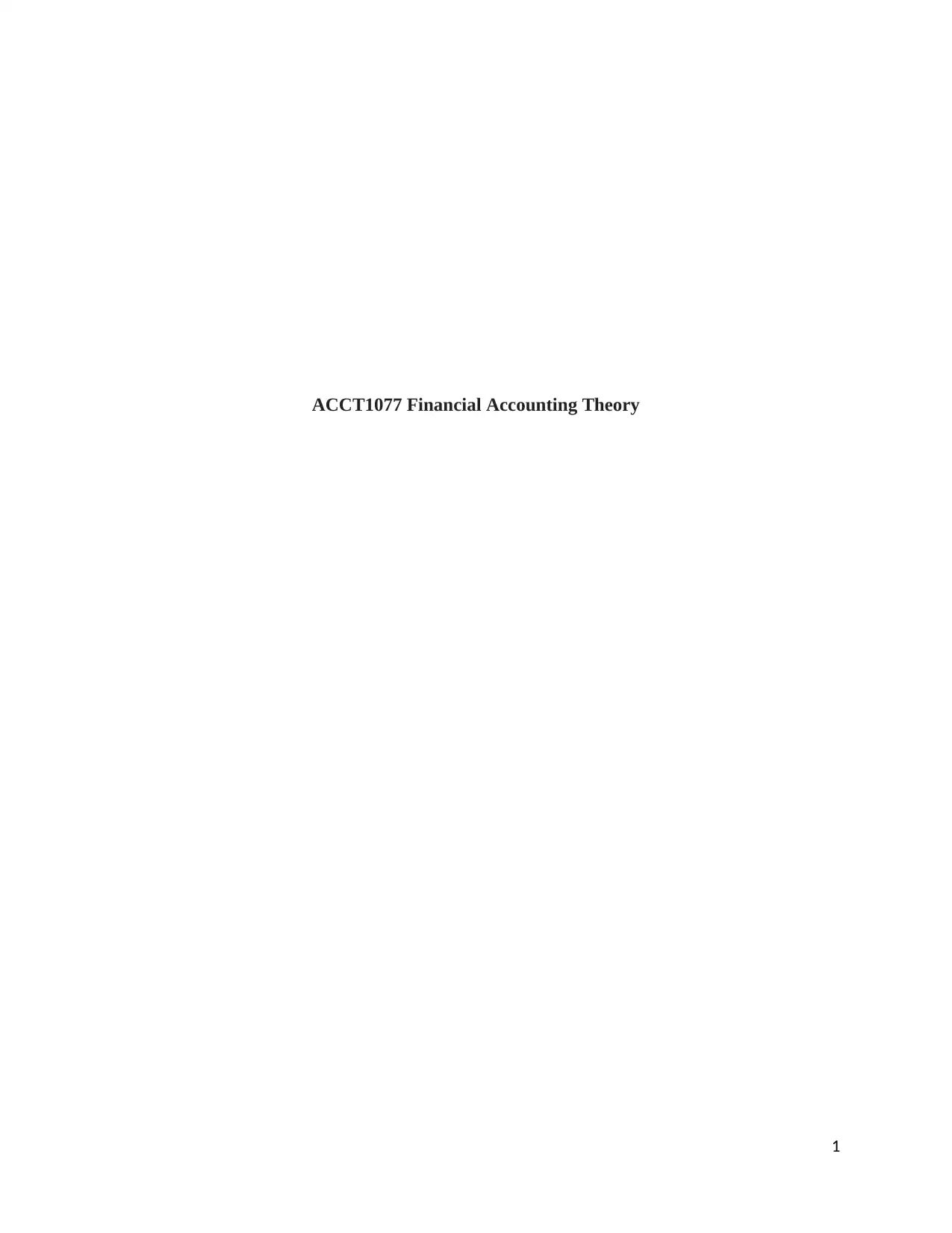
ACCT1077 Financial Accounting Theory
1
1
Secure Best Marks with AI Grader
Need help grading? Try our AI Grader for instant feedback on your assignments.
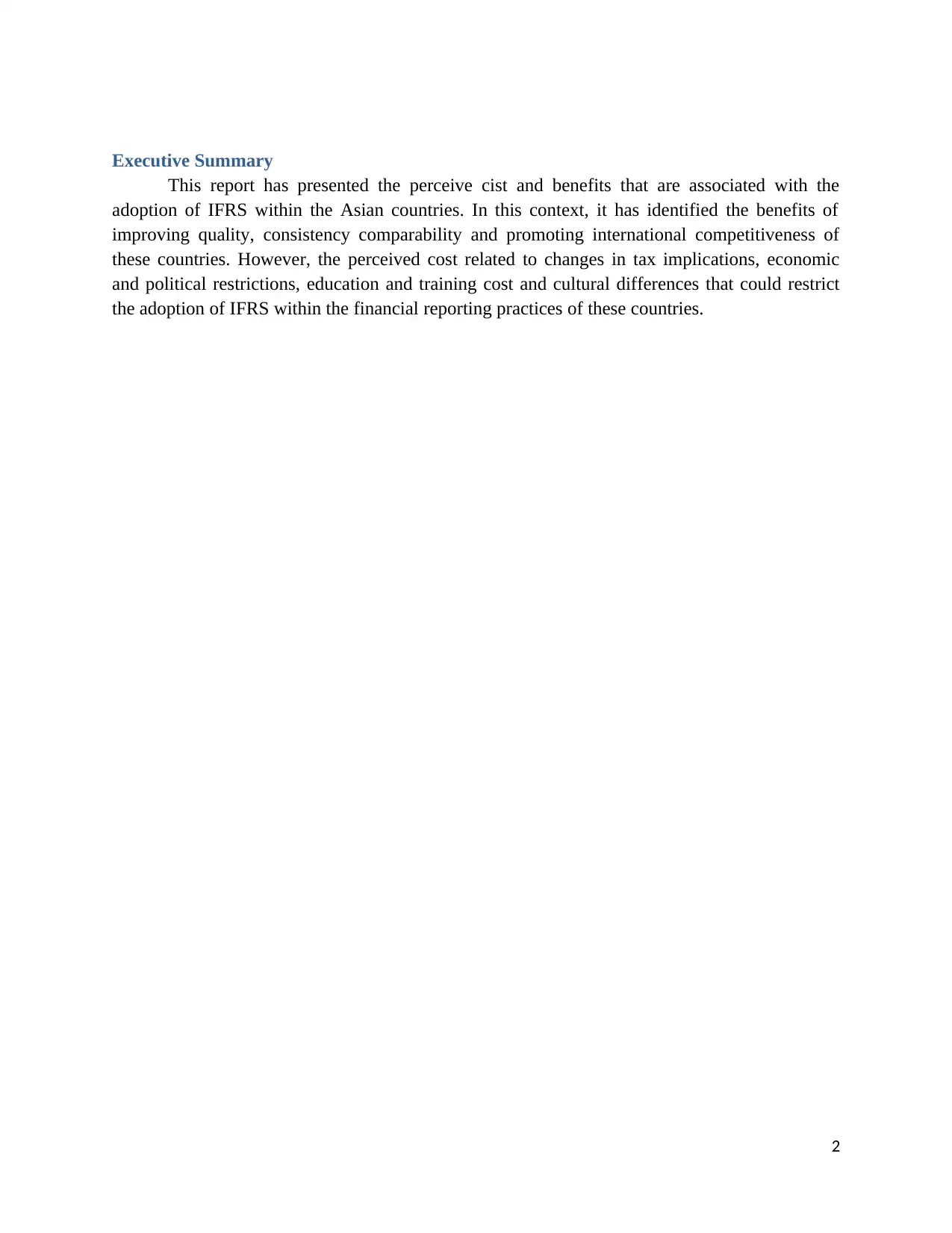
Executive Summary
This report has presented the perceive cist and benefits that are associated with the
adoption of IFRS within the Asian countries. In this context, it has identified the benefits of
improving quality, consistency comparability and promoting international competitiveness of
these countries. However, the perceived cost related to changes in tax implications, economic
and political restrictions, education and training cost and cultural differences that could restrict
the adoption of IFRS within the financial reporting practices of these countries.
2
This report has presented the perceive cist and benefits that are associated with the
adoption of IFRS within the Asian countries. In this context, it has identified the benefits of
improving quality, consistency comparability and promoting international competitiveness of
these countries. However, the perceived cost related to changes in tax implications, economic
and political restrictions, education and training cost and cultural differences that could restrict
the adoption of IFRS within the financial reporting practices of these countries.
2
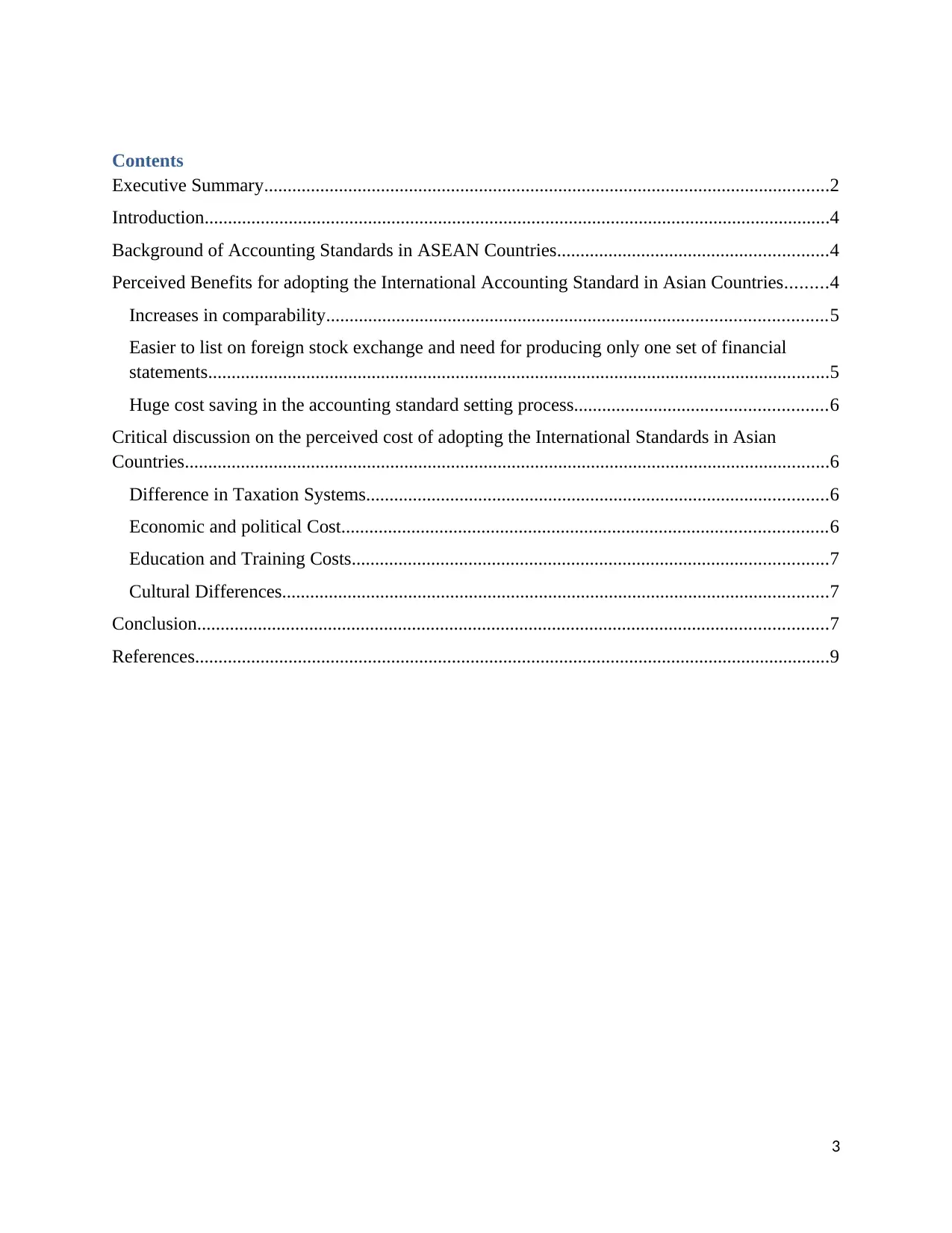
Contents
Executive Summary.........................................................................................................................2
Introduction......................................................................................................................................4
Background of Accounting Standards in ASEAN Countries..........................................................4
Perceived Benefits for adopting the International Accounting Standard in Asian Countries.........4
Increases in comparability...........................................................................................................5
Easier to list on foreign stock exchange and need for producing only one set of financial
statements.....................................................................................................................................5
Huge cost saving in the accounting standard setting process......................................................6
Critical discussion on the perceived cost of adopting the International Standards in Asian
Countries..........................................................................................................................................6
Difference in Taxation Systems...................................................................................................6
Economic and political Cost........................................................................................................6
Education and Training Costs......................................................................................................7
Cultural Differences.....................................................................................................................7
Conclusion.......................................................................................................................................7
References........................................................................................................................................9
3
Executive Summary.........................................................................................................................2
Introduction......................................................................................................................................4
Background of Accounting Standards in ASEAN Countries..........................................................4
Perceived Benefits for adopting the International Accounting Standard in Asian Countries.........4
Increases in comparability...........................................................................................................5
Easier to list on foreign stock exchange and need for producing only one set of financial
statements.....................................................................................................................................5
Huge cost saving in the accounting standard setting process......................................................6
Critical discussion on the perceived cost of adopting the International Standards in Asian
Countries..........................................................................................................................................6
Difference in Taxation Systems...................................................................................................6
Economic and political Cost........................................................................................................6
Education and Training Costs......................................................................................................7
Cultural Differences.....................................................................................................................7
Conclusion.......................................................................................................................................7
References........................................................................................................................................9
3
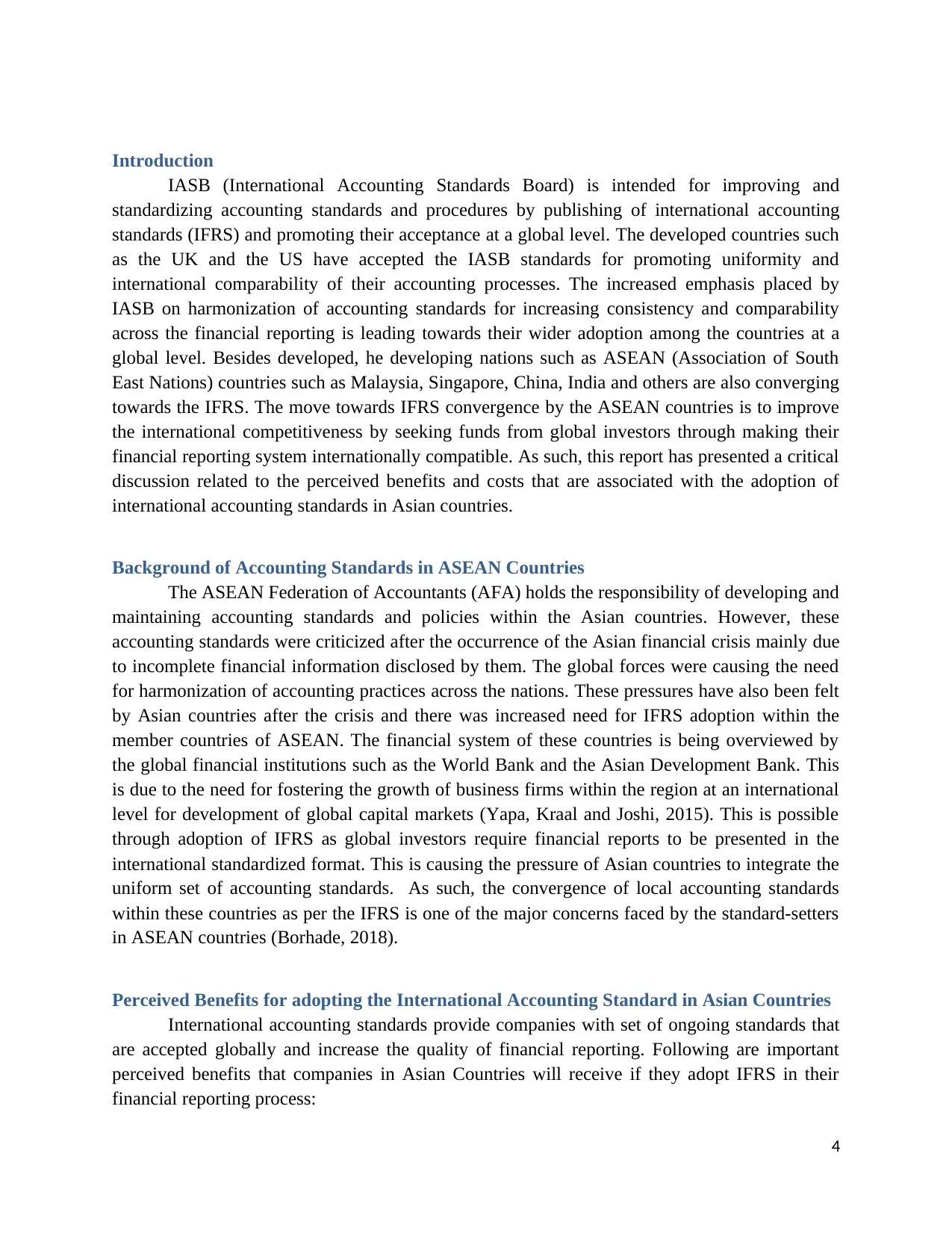
Introduction
IASB (International Accounting Standards Board) is intended for improving and
standardizing accounting standards and procedures by publishing of international accounting
standards (IFRS) and promoting their acceptance at a global level. The developed countries such
as the UK and the US have accepted the IASB standards for promoting uniformity and
international comparability of their accounting processes. The increased emphasis placed by
IASB on harmonization of accounting standards for increasing consistency and comparability
across the financial reporting is leading towards their wider adoption among the countries at a
global level. Besides developed, he developing nations such as ASEAN (Association of South
East Nations) countries such as Malaysia, Singapore, China, India and others are also converging
towards the IFRS. The move towards IFRS convergence by the ASEAN countries is to improve
the international competitiveness by seeking funds from global investors through making their
financial reporting system internationally compatible. As such, this report has presented a critical
discussion related to the perceived benefits and costs that are associated with the adoption of
international accounting standards in Asian countries.
Background of Accounting Standards in ASEAN Countries
The ASEAN Federation of Accountants (AFA) holds the responsibility of developing and
maintaining accounting standards and policies within the Asian countries. However, these
accounting standards were criticized after the occurrence of the Asian financial crisis mainly due
to incomplete financial information disclosed by them. The global forces were causing the need
for harmonization of accounting practices across the nations. These pressures have also been felt
by Asian countries after the crisis and there was increased need for IFRS adoption within the
member countries of ASEAN. The financial system of these countries is being overviewed by
the global financial institutions such as the World Bank and the Asian Development Bank. This
is due to the need for fostering the growth of business firms within the region at an international
level for development of global capital markets (Yapa, Kraal and Joshi, 2015). This is possible
through adoption of IFRS as global investors require financial reports to be presented in the
international standardized format. This is causing the pressure of Asian countries to integrate the
uniform set of accounting standards. As such, the convergence of local accounting standards
within these countries as per the IFRS is one of the major concerns faced by the standard-setters
in ASEAN countries (Borhade, 2018).
Perceived Benefits for adopting the International Accounting Standard in Asian Countries
International accounting standards provide companies with set of ongoing standards that
are accepted globally and increase the quality of financial reporting. Following are important
perceived benefits that companies in Asian Countries will receive if they adopt IFRS in their
financial reporting process:
4
IASB (International Accounting Standards Board) is intended for improving and
standardizing accounting standards and procedures by publishing of international accounting
standards (IFRS) and promoting their acceptance at a global level. The developed countries such
as the UK and the US have accepted the IASB standards for promoting uniformity and
international comparability of their accounting processes. The increased emphasis placed by
IASB on harmonization of accounting standards for increasing consistency and comparability
across the financial reporting is leading towards their wider adoption among the countries at a
global level. Besides developed, he developing nations such as ASEAN (Association of South
East Nations) countries such as Malaysia, Singapore, China, India and others are also converging
towards the IFRS. The move towards IFRS convergence by the ASEAN countries is to improve
the international competitiveness by seeking funds from global investors through making their
financial reporting system internationally compatible. As such, this report has presented a critical
discussion related to the perceived benefits and costs that are associated with the adoption of
international accounting standards in Asian countries.
Background of Accounting Standards in ASEAN Countries
The ASEAN Federation of Accountants (AFA) holds the responsibility of developing and
maintaining accounting standards and policies within the Asian countries. However, these
accounting standards were criticized after the occurrence of the Asian financial crisis mainly due
to incomplete financial information disclosed by them. The global forces were causing the need
for harmonization of accounting practices across the nations. These pressures have also been felt
by Asian countries after the crisis and there was increased need for IFRS adoption within the
member countries of ASEAN. The financial system of these countries is being overviewed by
the global financial institutions such as the World Bank and the Asian Development Bank. This
is due to the need for fostering the growth of business firms within the region at an international
level for development of global capital markets (Yapa, Kraal and Joshi, 2015). This is possible
through adoption of IFRS as global investors require financial reports to be presented in the
international standardized format. This is causing the pressure of Asian countries to integrate the
uniform set of accounting standards. As such, the convergence of local accounting standards
within these countries as per the IFRS is one of the major concerns faced by the standard-setters
in ASEAN countries (Borhade, 2018).
Perceived Benefits for adopting the International Accounting Standard in Asian Countries
International accounting standards provide companies with set of ongoing standards that
are accepted globally and increase the quality of financial reporting. Following are important
perceived benefits that companies in Asian Countries will receive if they adopt IFRS in their
financial reporting process:
4
Secure Best Marks with AI Grader
Need help grading? Try our AI Grader for instant feedback on your assignments.
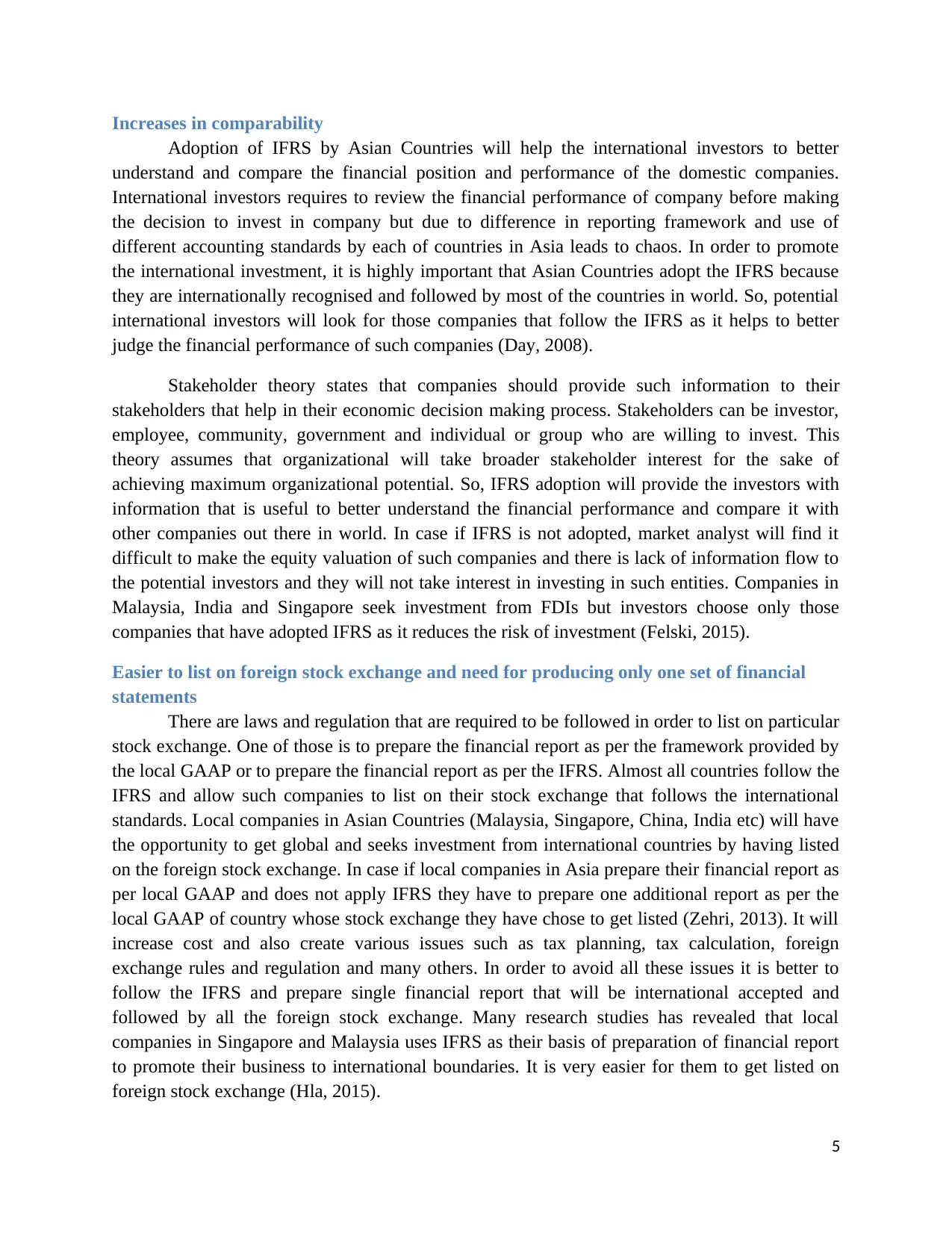
Increases in comparability
Adoption of IFRS by Asian Countries will help the international investors to better
understand and compare the financial position and performance of the domestic companies.
International investors requires to review the financial performance of company before making
the decision to invest in company but due to difference in reporting framework and use of
different accounting standards by each of countries in Asia leads to chaos. In order to promote
the international investment, it is highly important that Asian Countries adopt the IFRS because
they are internationally recognised and followed by most of the countries in world. So, potential
international investors will look for those companies that follow the IFRS as it helps to better
judge the financial performance of such companies (Day, 2008).
Stakeholder theory states that companies should provide such information to their
stakeholders that help in their economic decision making process. Stakeholders can be investor,
employee, community, government and individual or group who are willing to invest. This
theory assumes that organizational will take broader stakeholder interest for the sake of
achieving maximum organizational potential. So, IFRS adoption will provide the investors with
information that is useful to better understand the financial performance and compare it with
other companies out there in world. In case if IFRS is not adopted, market analyst will find it
difficult to make the equity valuation of such companies and there is lack of information flow to
the potential investors and they will not take interest in investing in such entities. Companies in
Malaysia, India and Singapore seek investment from FDIs but investors choose only those
companies that have adopted IFRS as it reduces the risk of investment (Felski, 2015).
Easier to list on foreign stock exchange and need for producing only one set of financial
statements
There are laws and regulation that are required to be followed in order to list on particular
stock exchange. One of those is to prepare the financial report as per the framework provided by
the local GAAP or to prepare the financial report as per the IFRS. Almost all countries follow the
IFRS and allow such companies to list on their stock exchange that follows the international
standards. Local companies in Asian Countries (Malaysia, Singapore, China, India etc) will have
the opportunity to get global and seeks investment from international countries by having listed
on the foreign stock exchange. In case if local companies in Asia prepare their financial report as
per local GAAP and does not apply IFRS they have to prepare one additional report as per the
local GAAP of country whose stock exchange they have chose to get listed (Zehri, 2013). It will
increase cost and also create various issues such as tax planning, tax calculation, foreign
exchange rules and regulation and many others. In order to avoid all these issues it is better to
follow the IFRS and prepare single financial report that will be international accepted and
followed by all the foreign stock exchange. Many research studies has revealed that local
companies in Singapore and Malaysia uses IFRS as their basis of preparation of financial report
to promote their business to international boundaries. It is very easier for them to get listed on
foreign stock exchange (Hla, 2015).
5
Adoption of IFRS by Asian Countries will help the international investors to better
understand and compare the financial position and performance of the domestic companies.
International investors requires to review the financial performance of company before making
the decision to invest in company but due to difference in reporting framework and use of
different accounting standards by each of countries in Asia leads to chaos. In order to promote
the international investment, it is highly important that Asian Countries adopt the IFRS because
they are internationally recognised and followed by most of the countries in world. So, potential
international investors will look for those companies that follow the IFRS as it helps to better
judge the financial performance of such companies (Day, 2008).
Stakeholder theory states that companies should provide such information to their
stakeholders that help in their economic decision making process. Stakeholders can be investor,
employee, community, government and individual or group who are willing to invest. This
theory assumes that organizational will take broader stakeholder interest for the sake of
achieving maximum organizational potential. So, IFRS adoption will provide the investors with
information that is useful to better understand the financial performance and compare it with
other companies out there in world. In case if IFRS is not adopted, market analyst will find it
difficult to make the equity valuation of such companies and there is lack of information flow to
the potential investors and they will not take interest in investing in such entities. Companies in
Malaysia, India and Singapore seek investment from FDIs but investors choose only those
companies that have adopted IFRS as it reduces the risk of investment (Felski, 2015).
Easier to list on foreign stock exchange and need for producing only one set of financial
statements
There are laws and regulation that are required to be followed in order to list on particular
stock exchange. One of those is to prepare the financial report as per the framework provided by
the local GAAP or to prepare the financial report as per the IFRS. Almost all countries follow the
IFRS and allow such companies to list on their stock exchange that follows the international
standards. Local companies in Asian Countries (Malaysia, Singapore, China, India etc) will have
the opportunity to get global and seeks investment from international countries by having listed
on the foreign stock exchange. In case if local companies in Asia prepare their financial report as
per local GAAP and does not apply IFRS they have to prepare one additional report as per the
local GAAP of country whose stock exchange they have chose to get listed (Zehri, 2013). It will
increase cost and also create various issues such as tax planning, tax calculation, foreign
exchange rules and regulation and many others. In order to avoid all these issues it is better to
follow the IFRS and prepare single financial report that will be international accepted and
followed by all the foreign stock exchange. Many research studies has revealed that local
companies in Singapore and Malaysia uses IFRS as their basis of preparation of financial report
to promote their business to international boundaries. It is very easier for them to get listed on
foreign stock exchange (Hla, 2015).
5
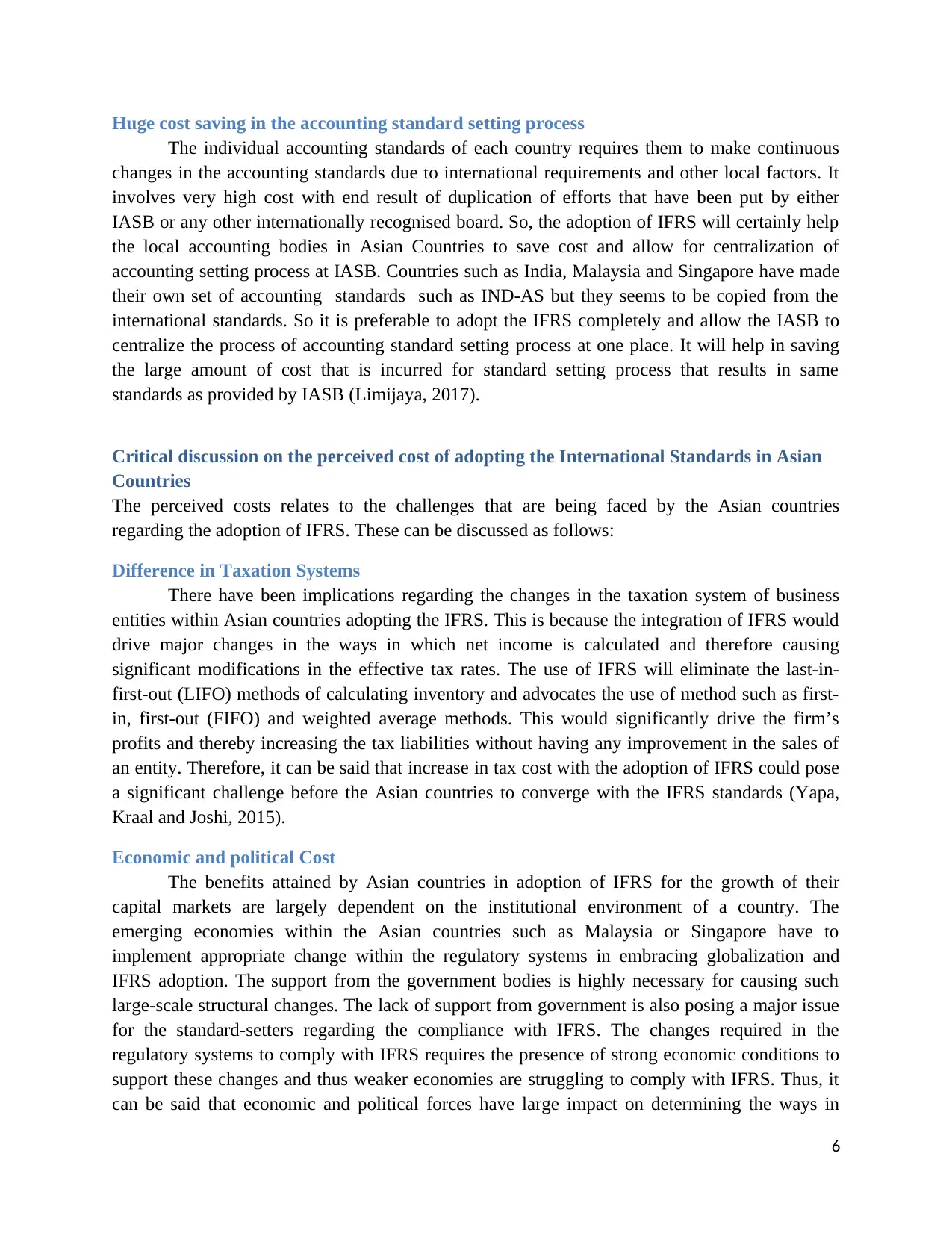
Huge cost saving in the accounting standard setting process
The individual accounting standards of each country requires them to make continuous
changes in the accounting standards due to international requirements and other local factors. It
involves very high cost with end result of duplication of efforts that have been put by either
IASB or any other internationally recognised board. So, the adoption of IFRS will certainly help
the local accounting bodies in Asian Countries to save cost and allow for centralization of
accounting setting process at IASB. Countries such as India, Malaysia and Singapore have made
their own set of accounting standards such as IND-AS but they seems to be copied from the
international standards. So it is preferable to adopt the IFRS completely and allow the IASB to
centralize the process of accounting standard setting process at one place. It will help in saving
the large amount of cost that is incurred for standard setting process that results in same
standards as provided by IASB (Limijaya, 2017).
Critical discussion on the perceived cost of adopting the International Standards in Asian
Countries
The perceived costs relates to the challenges that are being faced by the Asian countries
regarding the adoption of IFRS. These can be discussed as follows:
Difference in Taxation Systems
There have been implications regarding the changes in the taxation system of business
entities within Asian countries adopting the IFRS. This is because the integration of IFRS would
drive major changes in the ways in which net income is calculated and therefore causing
significant modifications in the effective tax rates. The use of IFRS will eliminate the last-in-
first-out (LIFO) methods of calculating inventory and advocates the use of method such as first-
in, first-out (FIFO) and weighted average methods. This would significantly drive the firm’s
profits and thereby increasing the tax liabilities without having any improvement in the sales of
an entity. Therefore, it can be said that increase in tax cost with the adoption of IFRS could pose
a significant challenge before the Asian countries to converge with the IFRS standards (Yapa,
Kraal and Joshi, 2015).
Economic and political Cost
The benefits attained by Asian countries in adoption of IFRS for the growth of their
capital markets are largely dependent on the institutional environment of a country. The
emerging economies within the Asian countries such as Malaysia or Singapore have to
implement appropriate change within the regulatory systems in embracing globalization and
IFRS adoption. The support from the government bodies is highly necessary for causing such
large-scale structural changes. The lack of support from government is also posing a major issue
for the standard-setters regarding the compliance with IFRS. The changes required in the
regulatory systems to comply with IFRS requires the presence of strong economic conditions to
support these changes and thus weaker economies are struggling to comply with IFRS. Thus, it
can be said that economic and political forces have large impact on determining the ways in
6
The individual accounting standards of each country requires them to make continuous
changes in the accounting standards due to international requirements and other local factors. It
involves very high cost with end result of duplication of efforts that have been put by either
IASB or any other internationally recognised board. So, the adoption of IFRS will certainly help
the local accounting bodies in Asian Countries to save cost and allow for centralization of
accounting setting process at IASB. Countries such as India, Malaysia and Singapore have made
their own set of accounting standards such as IND-AS but they seems to be copied from the
international standards. So it is preferable to adopt the IFRS completely and allow the IASB to
centralize the process of accounting standard setting process at one place. It will help in saving
the large amount of cost that is incurred for standard setting process that results in same
standards as provided by IASB (Limijaya, 2017).
Critical discussion on the perceived cost of adopting the International Standards in Asian
Countries
The perceived costs relates to the challenges that are being faced by the Asian countries
regarding the adoption of IFRS. These can be discussed as follows:
Difference in Taxation Systems
There have been implications regarding the changes in the taxation system of business
entities within Asian countries adopting the IFRS. This is because the integration of IFRS would
drive major changes in the ways in which net income is calculated and therefore causing
significant modifications in the effective tax rates. The use of IFRS will eliminate the last-in-
first-out (LIFO) methods of calculating inventory and advocates the use of method such as first-
in, first-out (FIFO) and weighted average methods. This would significantly drive the firm’s
profits and thereby increasing the tax liabilities without having any improvement in the sales of
an entity. Therefore, it can be said that increase in tax cost with the adoption of IFRS could pose
a significant challenge before the Asian countries to converge with the IFRS standards (Yapa,
Kraal and Joshi, 2015).
Economic and political Cost
The benefits attained by Asian countries in adoption of IFRS for the growth of their
capital markets are largely dependent on the institutional environment of a country. The
emerging economies within the Asian countries such as Malaysia or Singapore have to
implement appropriate change within the regulatory systems in embracing globalization and
IFRS adoption. The support from the government bodies is highly necessary for causing such
large-scale structural changes. The lack of support from government is also posing a major issue
for the standard-setters regarding the compliance with IFRS. The changes required in the
regulatory systems to comply with IFRS requires the presence of strong economic conditions to
support these changes and thus weaker economies are struggling to comply with IFRS. Thus, it
can be said that economic and political forces have large impact on determining the ways in
6
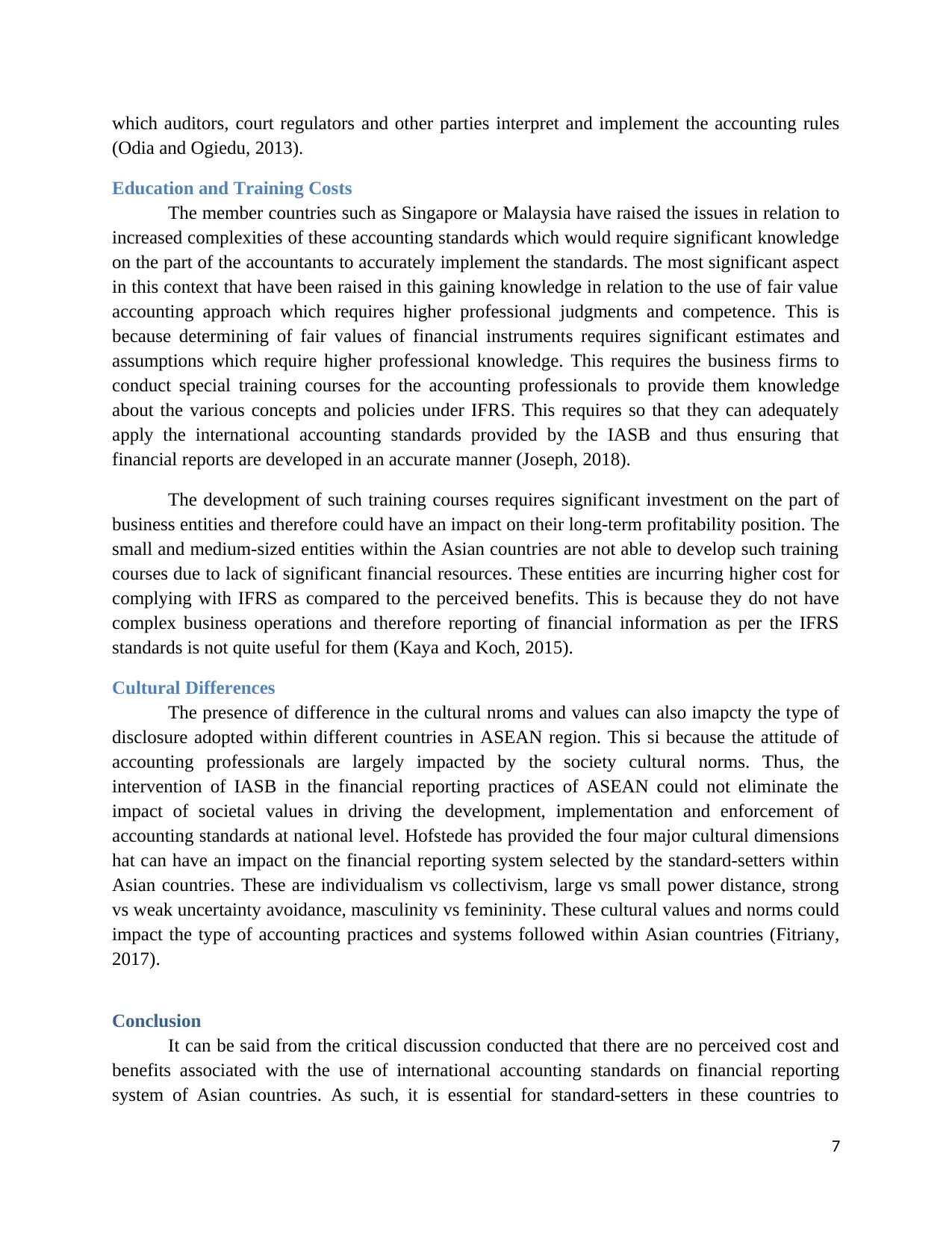
which auditors, court regulators and other parties interpret and implement the accounting rules
(Odia and Ogiedu, 2013).
Education and Training Costs
The member countries such as Singapore or Malaysia have raised the issues in relation to
increased complexities of these accounting standards which would require significant knowledge
on the part of the accountants to accurately implement the standards. The most significant aspect
in this context that have been raised in this gaining knowledge in relation to the use of fair value
accounting approach which requires higher professional judgments and competence. This is
because determining of fair values of financial instruments requires significant estimates and
assumptions which require higher professional knowledge. This requires the business firms to
conduct special training courses for the accounting professionals to provide them knowledge
about the various concepts and policies under IFRS. This requires so that they can adequately
apply the international accounting standards provided by the IASB and thus ensuring that
financial reports are developed in an accurate manner (Joseph, 2018).
The development of such training courses requires significant investment on the part of
business entities and therefore could have an impact on their long-term profitability position. The
small and medium-sized entities within the Asian countries are not able to develop such training
courses due to lack of significant financial resources. These entities are incurring higher cost for
complying with IFRS as compared to the perceived benefits. This is because they do not have
complex business operations and therefore reporting of financial information as per the IFRS
standards is not quite useful for them (Kaya and Koch, 2015).
Cultural Differences
The presence of difference in the cultural nroms and values can also imapcty the type of
disclosure adopted within different countries in ASEAN region. This si because the attitude of
accounting professionals are largely impacted by the society cultural norms. Thus, the
intervention of IASB in the financial reporting practices of ASEAN could not eliminate the
impact of societal values in driving the development, implementation and enforcement of
accounting standards at national level. Hofstede has provided the four major cultural dimensions
hat can have an impact on the financial reporting system selected by the standard-setters within
Asian countries. These are individualism vs collectivism, large vs small power distance, strong
vs weak uncertainty avoidance, masculinity vs femininity. These cultural values and norms could
impact the type of accounting practices and systems followed within Asian countries (Fitriany,
2017).
Conclusion
It can be said from the critical discussion conducted that there are no perceived cost and
benefits associated with the use of international accounting standards on financial reporting
system of Asian countries. As such, it is essential for standard-setters in these countries to
7
(Odia and Ogiedu, 2013).
Education and Training Costs
The member countries such as Singapore or Malaysia have raised the issues in relation to
increased complexities of these accounting standards which would require significant knowledge
on the part of the accountants to accurately implement the standards. The most significant aspect
in this context that have been raised in this gaining knowledge in relation to the use of fair value
accounting approach which requires higher professional judgments and competence. This is
because determining of fair values of financial instruments requires significant estimates and
assumptions which require higher professional knowledge. This requires the business firms to
conduct special training courses for the accounting professionals to provide them knowledge
about the various concepts and policies under IFRS. This requires so that they can adequately
apply the international accounting standards provided by the IASB and thus ensuring that
financial reports are developed in an accurate manner (Joseph, 2018).
The development of such training courses requires significant investment on the part of
business entities and therefore could have an impact on their long-term profitability position. The
small and medium-sized entities within the Asian countries are not able to develop such training
courses due to lack of significant financial resources. These entities are incurring higher cost for
complying with IFRS as compared to the perceived benefits. This is because they do not have
complex business operations and therefore reporting of financial information as per the IFRS
standards is not quite useful for them (Kaya and Koch, 2015).
Cultural Differences
The presence of difference in the cultural nroms and values can also imapcty the type of
disclosure adopted within different countries in ASEAN region. This si because the attitude of
accounting professionals are largely impacted by the society cultural norms. Thus, the
intervention of IASB in the financial reporting practices of ASEAN could not eliminate the
impact of societal values in driving the development, implementation and enforcement of
accounting standards at national level. Hofstede has provided the four major cultural dimensions
hat can have an impact on the financial reporting system selected by the standard-setters within
Asian countries. These are individualism vs collectivism, large vs small power distance, strong
vs weak uncertainty avoidance, masculinity vs femininity. These cultural values and norms could
impact the type of accounting practices and systems followed within Asian countries (Fitriany,
2017).
Conclusion
It can be said from the critical discussion conducted that there are no perceived cost and
benefits associated with the use of international accounting standards on financial reporting
system of Asian countries. As such, it is essential for standard-setters in these countries to
7
Paraphrase This Document
Need a fresh take? Get an instant paraphrase of this document with our AI Paraphraser
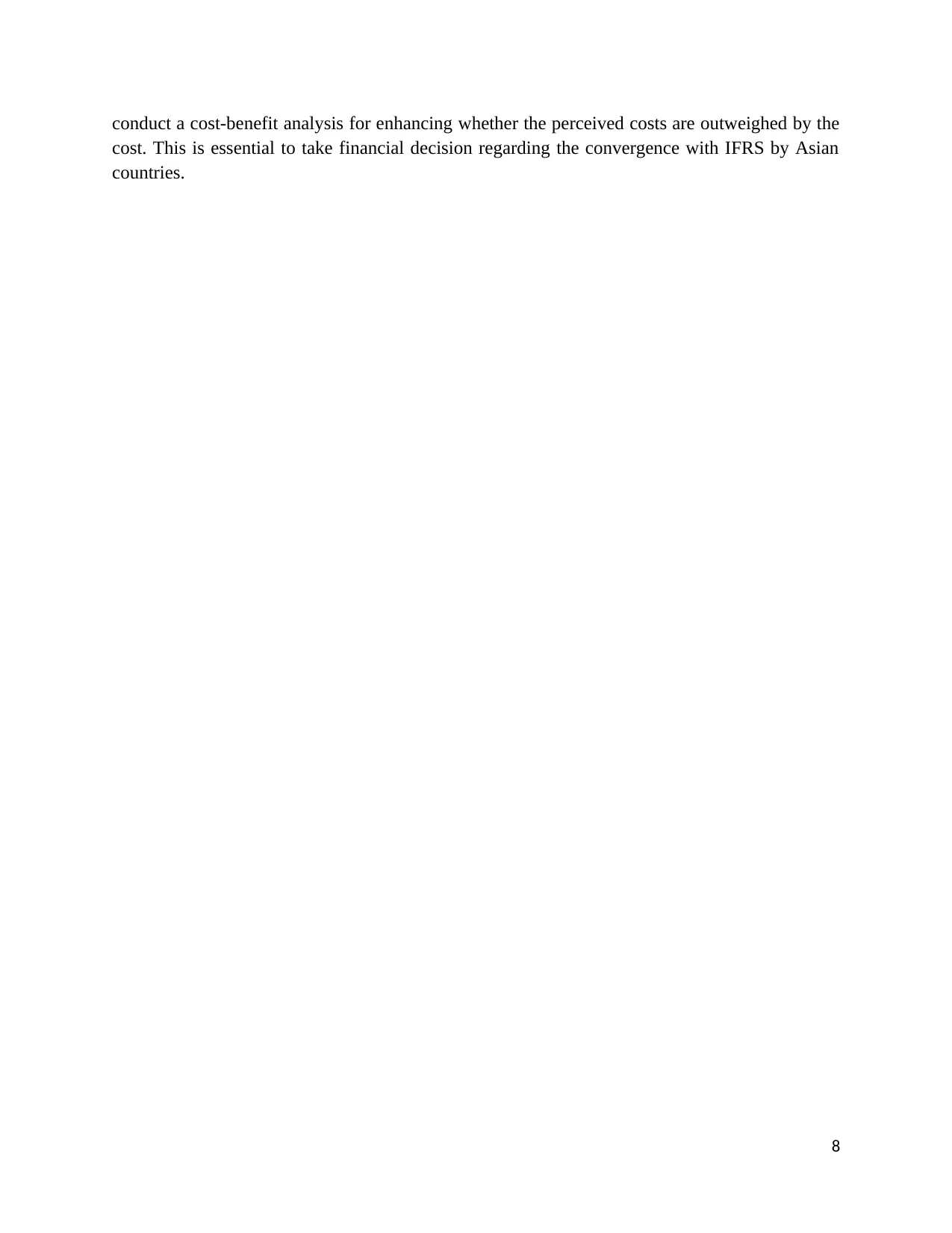
conduct a cost-benefit analysis for enhancing whether the perceived costs are outweighed by the
cost. This is essential to take financial decision regarding the convergence with IFRS by Asian
countries.
8
cost. This is essential to take financial decision regarding the convergence with IFRS by Asian
countries.
8
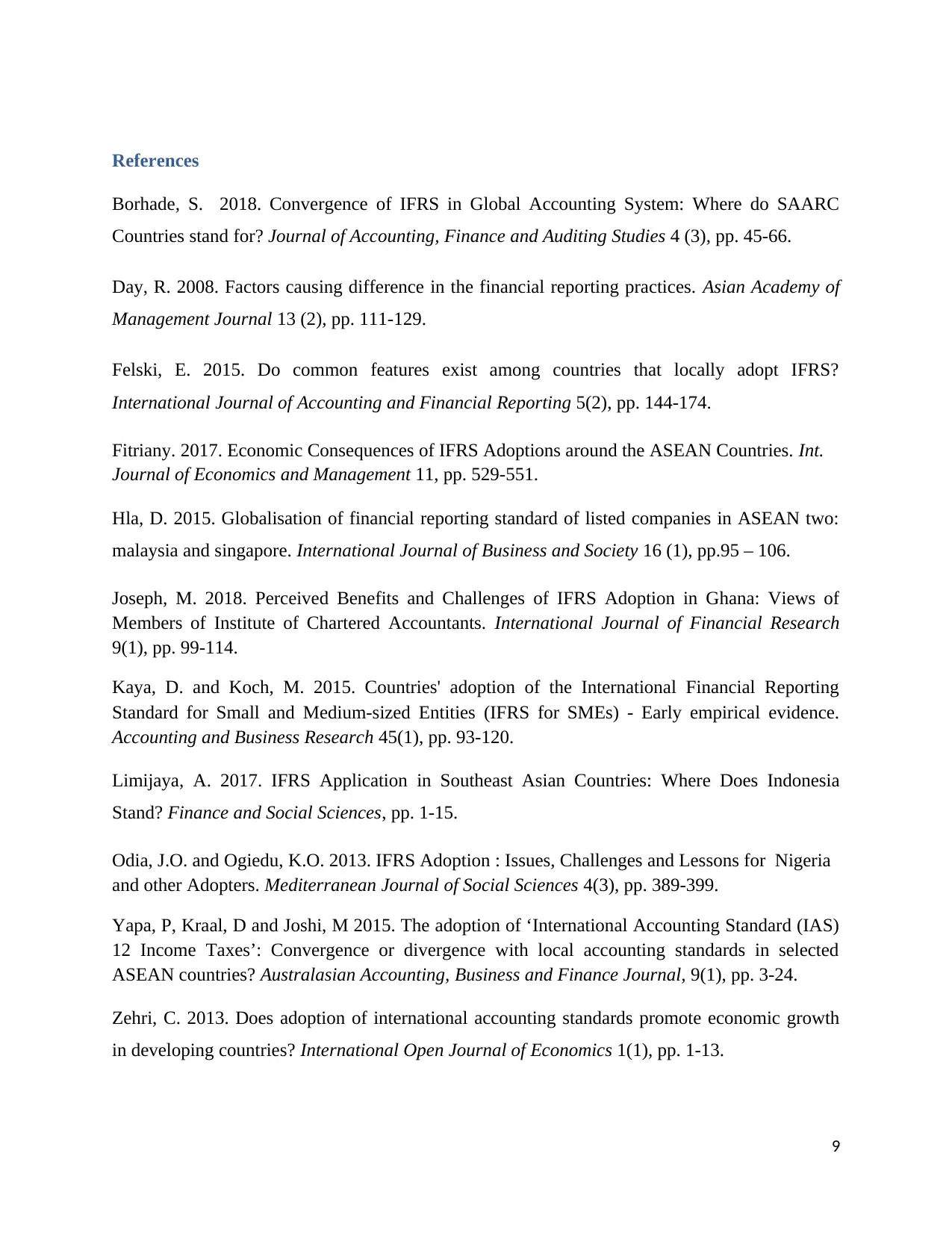
References
Borhade, S. 2018. Convergence of IFRS in Global Accounting System: Where do SAARC
Countries stand for? Journal of Accounting, Finance and Auditing Studies 4 (3), pp. 45-66.
Day, R. 2008. Factors causing difference in the financial reporting practices. Asian Academy of
Management Journal 13 (2), pp. 111-129.
Felski, E. 2015. Do common features exist among countries that locally adopt IFRS?
International Journal of Accounting and Financial Reporting 5(2), pp. 144-174.
Fitriany. 2017. Economic Consequences of IFRS Adoptions around the ASEAN Countries. Int.
Journal of Economics and Management 11, pp. 529-551.
Hla, D. 2015. Globalisation of financial reporting standard of listed companies in ASEAN two:
malaysia and singapore. International Journal of Business and Society 16 (1), pp.95 – 106.
Joseph, M. 2018. Perceived Benefits and Challenges of IFRS Adoption in Ghana: Views of
Members of Institute of Chartered Accountants. International Journal of Financial Research
9(1), pp. 99-114.
Kaya, D. and Koch, M. 2015. Countries' adoption of the International Financial Reporting
Standard for Small and Medium-sized Entities (IFRS for SMEs) - Early empirical evidence.
Accounting and Business Research 45(1), pp. 93-120.
Limijaya, A. 2017. IFRS Application in Southeast Asian Countries: Where Does Indonesia
Stand? Finance and Social Sciences, pp. 1-15.
Odia, J.O. and Ogiedu, K.O. 2013. IFRS Adoption : Issues, Challenges and Lessons for Nigeria
and other Adopters. Mediterranean Journal of Social Sciences 4(3), pp. 389-399.
Yapa, P, Kraal, D and Joshi, M 2015. The adoption of ‘International Accounting Standard (IAS)
12 Income Taxes’: Convergence or divergence with local accounting standards in selected
ASEAN countries? Australasian Accounting, Business and Finance Journal, 9(1), pp. 3-24.
Zehri, C. 2013. Does adoption of international accounting standards promote economic growth
in developing countries? International Open Journal of Economics 1(1), pp. 1-13.
9
Borhade, S. 2018. Convergence of IFRS in Global Accounting System: Where do SAARC
Countries stand for? Journal of Accounting, Finance and Auditing Studies 4 (3), pp. 45-66.
Day, R. 2008. Factors causing difference in the financial reporting practices. Asian Academy of
Management Journal 13 (2), pp. 111-129.
Felski, E. 2015. Do common features exist among countries that locally adopt IFRS?
International Journal of Accounting and Financial Reporting 5(2), pp. 144-174.
Fitriany. 2017. Economic Consequences of IFRS Adoptions around the ASEAN Countries. Int.
Journal of Economics and Management 11, pp. 529-551.
Hla, D. 2015. Globalisation of financial reporting standard of listed companies in ASEAN two:
malaysia and singapore. International Journal of Business and Society 16 (1), pp.95 – 106.
Joseph, M. 2018. Perceived Benefits and Challenges of IFRS Adoption in Ghana: Views of
Members of Institute of Chartered Accountants. International Journal of Financial Research
9(1), pp. 99-114.
Kaya, D. and Koch, M. 2015. Countries' adoption of the International Financial Reporting
Standard for Small and Medium-sized Entities (IFRS for SMEs) - Early empirical evidence.
Accounting and Business Research 45(1), pp. 93-120.
Limijaya, A. 2017. IFRS Application in Southeast Asian Countries: Where Does Indonesia
Stand? Finance and Social Sciences, pp. 1-15.
Odia, J.O. and Ogiedu, K.O. 2013. IFRS Adoption : Issues, Challenges and Lessons for Nigeria
and other Adopters. Mediterranean Journal of Social Sciences 4(3), pp. 389-399.
Yapa, P, Kraal, D and Joshi, M 2015. The adoption of ‘International Accounting Standard (IAS)
12 Income Taxes’: Convergence or divergence with local accounting standards in selected
ASEAN countries? Australasian Accounting, Business and Finance Journal, 9(1), pp. 3-24.
Zehri, C. 2013. Does adoption of international accounting standards promote economic growth
in developing countries? International Open Journal of Economics 1(1), pp. 1-13.
9
1 out of 9
Related Documents
Your All-in-One AI-Powered Toolkit for Academic Success.
+13062052269
info@desklib.com
Available 24*7 on WhatsApp / Email
![[object Object]](/_next/static/media/star-bottom.7253800d.svg)
Unlock your academic potential
© 2024 | Zucol Services PVT LTD | All rights reserved.





